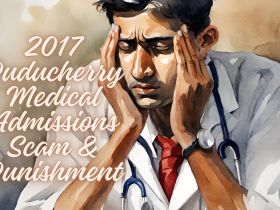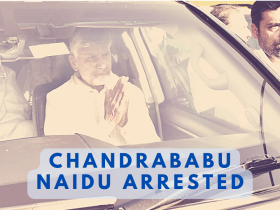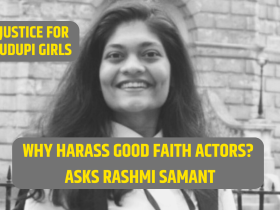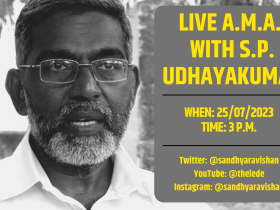By Sandhya Ravishankar & Sandhya Sridhar
He is privileged, therefore he is. However, let him not hold this umbrella of privilege over the larger community, for his privilege is just that – HIS.
The singer makes a case in his column in The Deccan Herald for caste-based social privilege being the root of all social evils in Tamil Nadu. But the nuances and layers of privilege are lost upon the obviously privileged self-acclaimed activist.
Caste confers terrible consequences on certain sections of society – the victims are mainly the so-called “untouchables” and the Shudra castes only slightly higher up the pecking order.
But does caste confer privileges? Yes and no. The so-called “upper” castes do find privilege in their birth – but in Tamil Nadu, that has only been for a very small section of the old moneyed and land-owning Brahmins. Krishna attempts to homogenise the Brahmins of Tamil Nadu and equate them to their North Indian counterparts. This trope is not only false, it is also absurd.
In simple terms – it’s all about the money, honey. Money begets power, connections and of course, more money. The ‘accident’ of genetics that Krishna refers to has nothing to do with privilege – economics has everything to do with that privilege.
Krishna’s Privilege
TM Krishna belongs to a family that boasts of a hoary and extremely wealthy past. His grand-uncle is TT Krishnamachari, son of a Madras High Court judge TT Rangachari during the British Raj.
Krishnamachari was a two-time Union Finance Minister of independent India in Nehru’s and Morarji Desai’s cabinet. So influential was Krishnamachari, that despite having to resign over corruption allegations, Nehru brought Krishnamachari back into his cabinet without a portfolio. Lal Bahadur Shastri later made him Union Finance Minister in his cabinet.
TT Krishnamachari is also the founder of the vast and wealthy TTK Group which manufactured and sold everything from pressure cookers to cosmetics and condoms.
The TTK Group, set up in 1928, according to a 2017 article in the Financial Express, provided “distribution for products ranging from foods, personal care products, writing instruments, and brands such as Cadbury’s, Max Factor, Kiwi, Kraft, Sunlight, Lifebuoy, Lux, Ponds, Brylcreem, Kellogg’s, Ovaltine, Horlicks, Sheaffer’s, Waterman’s and many more.”
TT Krishnamachari’s son TT Vasu succeeded him in his business from the 1930s. The lineage of money and influence was bequeathed to Vasu as well. A significant incident in the 1950s is narrated by the late S Muthiah, a Chennai-based historian, in his book on TT Vasu – The Man Who Could Never Say No.
“TTKs applied for a license to manufacture Ponds products in Madras. C Rajagopalachari, (Rajaji) the chief minister of Madras turned down the application saying “Sita never used cosmetics. I do not understand why Indian women need such products now.” TTK who was then the industries minister in Delhi, refused to get involved. He sent the file to prime minister Nehru saying as he was an interested party, he did not want to take a decision. Nehru approved the project and is said to have told HVR Iyengar, the principal secretary of the industries minister, “Sita was a naturally beautiful woman and not many Indians are blessed like her, so they must have the help they feel they must need.”
This same TT Vasu, an uncle of TM Krishna, would play an important role in boosting the latter’s Carnatic music career at a young age. In an interview, Seetarama Sarma, Krishna’s music guru, recounts how TT Vasu helped Krishna.
“Krishna’s first concert was in 1988 at the Spirit of Youth series at the Music Academy. I was hesitant to let him perform, but agreed on the insistence of T.T. Vasu. This concert during Navaratri turned out to be his arangetram, where he impressed one and all with a very fine performance,” he narrated. Krishna was 12 years old at the time.
Sarma states that TM Krishna was then given a slot unfailingly every year thereafter. “From 1988 onwards he was given a slot at the Academy every year without a break. He was promoted to the 2 pm slot and then the 4 pm senior slot. In 1996, he applied to AIR on my advice. He directly got the B High grade,” said the guru.
It is also of interest to note that TT Vasu was President of the Music Academy – a revered sabha which his father helped set up – since 1983. He would be President for two decades hence, playing a great role in reviving the Carnatic music industry and the Academy itself.
The purpose of this piece is not to malign TM Krishna or his family. It is to show him a mirror.
Money Begets Money & Influence
Strikingly, this background of TM Krishna’s is similar to those of the founders of the Justice Party and later the Dravidar Kazhagam and the Dravida Munnetra Kazhagam, with some exceptions.
Whether Dr C Natesa Mudaliar, TM Nair, Sir P Theagaraya Chetty, Alamelu Mangai Thayarammal, the Raja of Panagal and even EV Ramasamy Naicker or Periyar – the founders and the core supporters of the South Indian Liberation Federation as well as the subsequent Justice Party, were all wealthy, land-owning and influential people.
But none of these elite politicians were born into Brahmin families. Yet, unquestioned privilege was accorded to them.
Let us look at the other side of the story of caste – Muthuvel Karunanidhi, former chief minister of Tamil Nadu was born into a small caste group – known as the Isai Vellalars. He came from a very humble background, without any money or land, by his own admission in his autobiography Nenjukku Needhi.
Compare Karunanidhi with K Kamaraj, born into a humble Nadar home, who had to drop out of school to support his family. He too became a chief minister of Tamil Nadu, but as part of the Congress party.
The argument that money begets money, power and influence, is stark in this case. Karunanidhi’s family has gone on to become a legacy political family – his son MK Stalin is now the chief minister of the state and his grandson Udhayanidhi Stalin is being prepped to be the next.
On the other hand, Kamaraj, well known to have been a clean and non-corrupt politician, died in poverty. His family too lives in grinding poverty today, without a single member being in politics.
“The benefits that accrue from the accident of my birth are emotional, psychological, social, and economic,” says Krishna in that blithe and open way that he assumes while writing the opinion piece. However, as we have seen above, the only accident of birth that connects the dots of the supporting ecosystem is economic, i.e., money.
Homogenising Brahmins of Tamil Nadu
TM Krishna has been an icon of self-flagellation for a few years now, his music now playing literally second fiddle to this very peculiar banner of activism. So much so, that every profile that lists him online describes him as belonging to the “upper-caste” and an activist among other things, his primary vocation as a Carnatic vocalist seemingly in the backseat.
Not all Brahmins are told they are ‘special’, not everyone receives the same validation that he did while in childhood – that his caste-related knowledge gave him that special edge, that deemed him ‘sophisticated, spiritual, abstract and elevated’. The accident of birth is an accident for all others as well. But this accident has not been so lucky for everyone just because of their caste.
For every Krishna, there are 10 ordinary ‘parpans’ (Brahmins in Tamil), whose caste probably made them less equipped for the rough and tumble of making their way in a world that was flat, where people mocked their caste and religious practises, made fun of them as being effeminate and less macho.
Many Brahmins, especially those belonging to the priestly classes, astrologers or simply book-keepers in villages, did not wind up as judges or industrialists – they remained lowly clerks, firmly entrenched in the middle class, much like everyone else from any other caste.
Numerous others continue to lead poor or middle class lives to date. Their caste is no privilege for them without a wealthy and influential godfather. No one comes to their rescue when they go under, just by virtue of their caste.
“Which is why marks in examinations is an obsession,” to quote Krishna – the very reason that the middle and lower class Tamil Brahmins drum the message into the heads of their children – study well and go to the US so that you can escape the discrimination in Tamil Nadu.
The Tout of Tropes
Krishna says in his piece: “The benefits that accrue from the accident of my birth are emotional, psychological, social, and economic. I have placed the economic last because this is a default fall-out of all the former.”
Brahmins are 2% of the population in Tamil Nadu. A miniscule minority by demographic standards However, this does not automatically determine that the majority of brahmins are wealthy, privileged and cushioned by what Krishna states: “Caste-privileged collectivity provides us with a wide and unsaid network that is always available.”
This instead, is the privilege of generations of wealth and the wealth-privileged connectivity, which is the lot of the lucky few, to which Krishna and his hoary family belong. This connectivity, seems to have turned Krishna’s family into fantastic generations of super-achievers by his own admission: “My home is abuzz with stories of grandfathers and great-grandmothers who achieved something or the other.”
In stating this, all we are trying to establish here, is that this huge swathe of generous generalisation that Krishna uses time again to beat up himself that itself comes from his position of privilege.
This is better known as the ivory tower syndrome, that has the members viewing the world from so far up that they cannot see the ground.Is this why Krishna makes his assumptions so breezily, from higher virtual viewpoint, unable to see caste and his ecosystem have no intersection really, and makes him blind to what is going on the ground?
The average Brahmin knows reality and does not aspire beyond it politically or economically – her only life, as with most others born into other castes, is education and finding a good job; ‘accidents’ do not happen so often and so easily in the manner that Krishna states. Accidents also do not pick class; other normal people call it ‘luck’.
“Evidently, none of this is about the economic aspect directly. It is socio-cultural, and even the economically backward among the caste privileged have access to it,” says Krishna in his piece. How did he jump to this conclusion? What is the basis for such a sweeping assumption? We see that today, in temples and in society, there are Brahmins who are the lowest in the economic pecking order. In fact, priests in temples are paid ridiculously low salaries, as if by sheer dint of their caste or the ‘privileges’ that it carries, food and living expenses automatically accrue to them instantly by some divine means.
“The suicide of a person with caste privilege receives abundant social attention.” How did Krishna come to that conclusion? Recent suicides which made the news are of various celebrities – actors Lokesh Rajendran, Pauline Jessica, aka Deepa, designer and writer Thoorigai Kabilan and even Anita, a Dalit girl who became the storm of a political controversy over NEET.
The “Brahminical” horse is long dead. To flog it again and again, speaks of a perverse need to self-position. Activism “speak” today must take head on the social challenges that are the product of the time and the age we live in today.
Those with privilege can drive this change. Not to introspect and step up speaks loudly about the impetus behind such positions.
[Note: Suicide is not an answer to any problems. If you are suffering suicidal thoughts, help is at hand. Please contact Sneha at 044-24640050 or the Tamil Nadu government’s helpline at 85265 65656.]












Leave a Reply